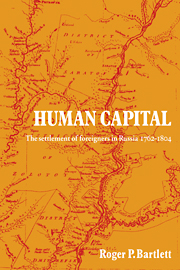Book contents
- Frontmatter
- Contents
- Weights and measures
- Abbreviations
- Preface
- Introduction
- I Antecedents
- 2 Catherine II and the Manifestos of 1762 and 1763
- 3 The response: settlement 1763–1775
- 4 Southern Russia 1764—1796
- 5 Urban and entrepreneurial settlement under the 1763 Manifesto
- 6 Immigration and colonies 1797–1804
- Conclusion
- Appendices
- Notes
- Bibliography
- Index
2 - Catherine II and the Manifestos of 1762 and 1763
Published online by Cambridge University Press: 05 May 2010
- Frontmatter
- Contents
- Weights and measures
- Abbreviations
- Preface
- Introduction
- I Antecedents
- 2 Catherine II and the Manifestos of 1762 and 1763
- 3 The response: settlement 1763–1775
- 4 Southern Russia 1764—1796
- 5 Urban and entrepreneurial settlement under the 1763 Manifesto
- 6 Immigration and colonies 1797–1804
- Conclusion
- Appendices
- Notes
- Bibliography
- Index
Summary
The immediate context: Catherine and public opinion
Catherine II was a confirmed adherent of ‘populationist’ views and well aware of their applicability to Russia. ‘No prince in modern times has ever made the subject of population so intimate a concern of government as the late empress’, claimed William Tooke. Even before her accession, Catherine had expressed herself in favour of measures to increase population. In the notes previously quoted she followed up her proposal, ‘let's make our enormous deserts swarm’, with the practical suggestion that conversion of Russia's non–Christian subjects was in general to be avoided, since ‘polygamy is more useful for the population’. Another note deplored the high rate of death in infancy in Russia: ‘what a loss to the State!’ The Instruction, Catherine's most explicit political credo, has a whole chapter (Chapter XII) devoted to population, written in the same spirit, and much of it taken directly from Montesquieu.
The Empress's personal interest and initiatives led to the execution during the 1760s of various ‘populationist’ measures apart from the scheme of foreign settlement: the creation of a Medical College, for example, and the establishment of Foundling Houses. Her reign was in fact the first in Russia to show systematic concern with population; and the historian of her population policies, M. M. Shpilevsky, regarded this preoccupation as the driving force behind all her social legislation. Catherine's policies in this field cannot, of course, be considered in isolation from her other preoccupations.
- Type
- Chapter
- Information
- Human CapitalThe Settlement of Foreigners in Russia 1762–1804, pp. 31 - 56Publisher: Cambridge University PressPrint publication year: 1979



